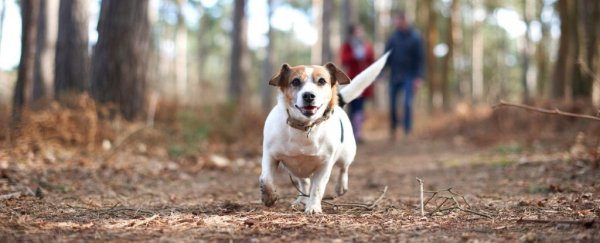Domestic dogs are fertilizing the green spaces where they regularly poop and pee, and not in a good way. Even in nature reserves where dogs are supposed to be kept on leash, a new study in Belgium shows our pets' droppings are a major disturbance to wildlife.
Each year, researchers estimate the paths that run through four nature reserves around Ghent are soiled with up to 11.5 kilograms (25.4 pounds) of nitrogen and 4.8 kilograms (10.6 pounds) of phosphorus per hectare.
The nitrogen comes from both dog urine and dog feces, while the phosphorus is mainly from the latter. At such high concentrations, the authors argue these nutrients have the potential to influence biodiversity and ecosystem functioning considerably.
Across all four nature reserves in the current study, researchers counted 1,629 dog visitors in a year and a half. While most of these canines were kept on leash, nearly a third were not, despite that being the rule for the reserves.
Models show that if all these dogs were leashed, the concentrations of nitrogen and phosphorus along the paths would be substantially increased, reaching as high as 175 kg of nitrogen and 73 kilograms of phosphorus a year.
"In our scenario where all dogs were kept on leashes, we found that in these concentrated areas around paths, nutrient inputs of both nitrogen and phosphorus exceeded legal limits for fertilization of agricultural land," says bioscience engineer Pieter De Frenne of Ghent University.
"Which is quite staggering as our study concerned nature reserves!"
That sounds much worse at first, but because the pollution is contained to a smaller area, it means the overall nature reserve could be less impacted.
If all the pet owners visiting Ghent's nature reserves both leashed their dogs and took the time to pick up their dog's droppings, models show they could reduce nitrogen pollution by 56 percent and phosphorus pollution by 97 percent along these paths.
The findings underline how important it is to leash and clean up after our pets in green spaces. Letting dogs run loose is probably contributing to species decline in ways their owners don't realize.
Unfortunately, doggy doo-doos are rarely considered as sources of nitrogen and phosphorus pollution, despite their potentially huge contribution.
"We were surprised by how high nutrient inputs from dogs could be," says De Frenne.
Across Europe, fossil fuel emissions and agriculture produce between 5 and 25 kilograms of nitrogen per hectare. Dogs could be contributing something similar.
In Europe alone there are an estimated 87 million dogs releasing their bladder and bowels every day, and the accumulation of all that excrement is likely taking a toll on the environment.
We just don't know how bad the problem is yet; the studies simply haven't been done. But when soil becomes saturated with macronutrients like nitrogen and phosphorus, past research has shown it can have a strongly negative impact on the local ecosystem.
Previous studies, for instance, have shown plant life can become less diverse with added nitrogen. Whereas added phosphorus has been shown to reduce the niche in which many threatened plant species thrive.
"It is clear that the levels of fertilization by dogs estimated here can potentially exert negative effects on biodiversity and ecosystem functioning of species-rich vegetation that are often pursued in forest and nature management," the authors write.
"Higher nutrient levels lead to increased plant growth, mostly by a limited number of nutrient-demanding species that will outcompete specialists, particularly by taking away the available light, causing plant species loss and homogenization of plant communities."
Even when dog bans are implemented along beaches or green spaces, it can take years for the elevated nitrogen and phosphorus in a habitat to fade out of the system.
The findings from the current study suggest dogs are a substantial and underestimated source of soil pollution around the world. If we don't tackle this problem soon, our restoration goals could continue to silently suffer.
The authors call for better enforcement of leash laws and urge pet owners to pick up their dog's droppings. More off-leash dog parks where pets can do their business freely could also help take pressure off wild spaces we are trying to maintain or restore.
After all, our dogs have got to go somewhere.
The study was published in Ecological Solutions and Evidence.
